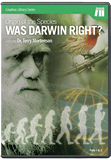Human Origins
Out of Africa?
The so-called “Out of Africa” model of human origins assumes that Homo erectus evolved in Africa and colonized the world before being “replaced” by modern Homo sapiens. But in Central Asia, archaeologists have found evidence of human occupation that predates any evidence of humans in Africa.
Common Ancestor
Biochemist Douglas Theobald attempted to statistically test the hypothesis that all life evolved from the same common ancestor —one of Darwin’s primary assertions. The similarity across life is usually attributed to universal ancestry. Creationists know similarities make sense in light of a single Designer.
Our Human Hand
The need to punch out rivals may have driven the evolution of the human hand, according to a study just published in the Journal of Experimental Biology. While our violent nature is evident in our history, it did not drive the evolution of our anatomy. God designed our hand anatomy from the beginning.
News About Human Origins
-
Aug. 22, 2022 from Ken Ham Blog
Many scientists know there’s big problems with the big bang idea. And the new images from the James Webb Space Telescope haven’t helped those who cling to it.
-
Aug. 18, 2022 from Ken Ham Blog
In a biblical worldview we know that dates thrown around for when humans first settled North America are not correct—so when did Native Americans first arrive?
Articles About Human Origins
-
Sept. 24, 2022 from Answers Magazine
Did God make Adam from dust? The answer is obvious, isn’t it?
-
In-Depth ArticleDoes Hugh Ross Believe in Soulless Ancient Humans?April 20, 2015 from Answers in Depth
Dr. Hugh Ross accepts the biblical truth that Adam and Eve were the parents of all modern humans, so in his estimation Neanderthals must have been animals.
-
June 14, 2014 from Answers in Depth
Did five million years of duking it out over females build the modern human male visage?
-
Evolutionary Researchers: Human Hand Evolved for Dual AbilitiesJan. 12, 2013
The human hand had to evolve for both fighting and finesse, say evolutionary researchers.
-
Another Variety of Archaic HumansAug. 11, 2012
Genetic evidence found for another variety of “archaic” human.
-
Book Chapter2.6 The Origin of Religions (OB6)July 12, 2012 from Did God Use Evolution?
All people have three fundamental types of information at their disposal, given them at creation according to the Bible.
-
Book Chapter2.3 The Origin of the Sexes (OB3)June 21, 2012 from Did God Use Evolution?
How is it then possible that such different and complex organs, which fit one another in every morphological and physiological detail, could have evolved suddenly?
-
Book Chapter2.1 The Origin of Man (OB1)May 31, 2012 from Did God Use Evolution?
On informatical/theoretical grounds it can be stated that there will never be a phylogenetically based genealogical tree of man.
-
The Story of UsJan. 14, 2012 from News to Know
“Mankind the Story of All of Us” likely to be more “story” than “history.”
-
-
Socialization: How Humans Learned to Interact With OthersNov. 19, 2011 from News to Know
The evolution of how we work and play well with others
-
Oct. 1, 2011 from Answers Magazine
Evidence of early stone artifacts in Central Asia has once again upset the human evolution cart.
-
Cooking: The World’s Oldest ProfessionAug. 27, 2011 from News to Know
Home-cooked meals: secret of our evolutionary leap
-
Evolutionists Attempt to Explain Human GenerosityAug. 6, 2011
Evolutionists have long struggled to explain human generosity. Evolutionary dogma dictates that behavior patterns which “unnecessarily give up resources without return” should die out in favor of behaviors that “retain those resources” for self or family.
-
-
Magazine Department ArticleOut of Israel?June 6, 2011 from Answers Magazine
Teeth from a supposed 400,000-year-old human found in Israel have presented two major problems for the evolution belief system.
-
Magazine Department ArticleNo Chinese Puzzle at AllApril 1, 2011 from Answers Magazine
The presence of “early modern” human remains in China pose no real puzzle for creationists to solve.
-
Teeth That Could Change EverythingJan. 8, 2011 from News to Know
Is Homo sapiens twice as old as was previously believed? Or are evolutionists simply twice as credulous?
-
Probability of Humans Uniquely CreatedMay 15, 2010
According to one scientist, new research shows that the probability humans were uniquely created is 1 in 106000. How can such a specific figure be wrong?
-
Have a LaughJune 13, 2009 from News to Know
Apes have been laughing for 10 million years, showing that laughter originated in a common ancestor of apes and humans. Ha!
-
An Evolutionist Claims Humans are Descended From the Same Ancestor 5,000 years AgoDec. 20, 2008
We are all descended from the same ancestor about 5,000 years ago—the claim of an evolutionist?
-
Energy-Saving Tip: Walk Like a HumanMay 24, 2008
It’s a find so closely connected to human origins that the BBC News version of the story claimed our “[a]ncestors had leg-up to trees.”
-
April 1, 2008 from Answers Magazine
Hollywood sees human origins as a topic that can generate box office revenue in the culture wars of the day.
-
Where Man Comes FromJuly 21, 2007
In order to determine the region of mankind's origin, a group of researchers, led by Andrea Manica of the University of Cambridge, examined genetic data and took skull measurements from “105 populations around the world.
-
Kinds of ManApril 7, 2007
Researchers have announced in the Proceedings of the National Academy of Sciences the discovery of “34 bone fragments belonging to a single” thought-to-be early modern human in China.
-
“The Way We Were: Human Origins Research in Ethiopia”April 23, 2002
I attended a lecture with the above title given at Miami University by Dr Tim White, a leading researcher on human evolution from the University of California at Berkeley (California).
-
Micro-Primates . . . a Transitional Form or Just Heel-Bone Hype?March 22, 2000
In the Book of Genesis, God makes it very clear that man was created special on the sixth day of the Creation Week.
-
Magazine ArticleWilhelm Schmidt and the Origin of ReligionJune 1, 1992, pp. 20–21
When studying and comparing religions, numerous modern authors have given explanations as to how the faiths arose. Many have been educated in universities that have accepted evolution as fact.
-
Magazine ArticleNew Observations on North American OriginsJune 1, 1978, pp. 10–11
A book America B.C. published in 1975 by Barry Fell, a Harvard marine biologist, is shattering previously held views and presuppositions about North American anthropology and cultural origins.
Recommended Resources

Answers in Genesis is an apologetics ministry, dedicated to helping Christians defend their faith and proclaim the good news of Jesus Christ.
- Customer Service 800.778.3390
- © 2024 Answers in Genesis











